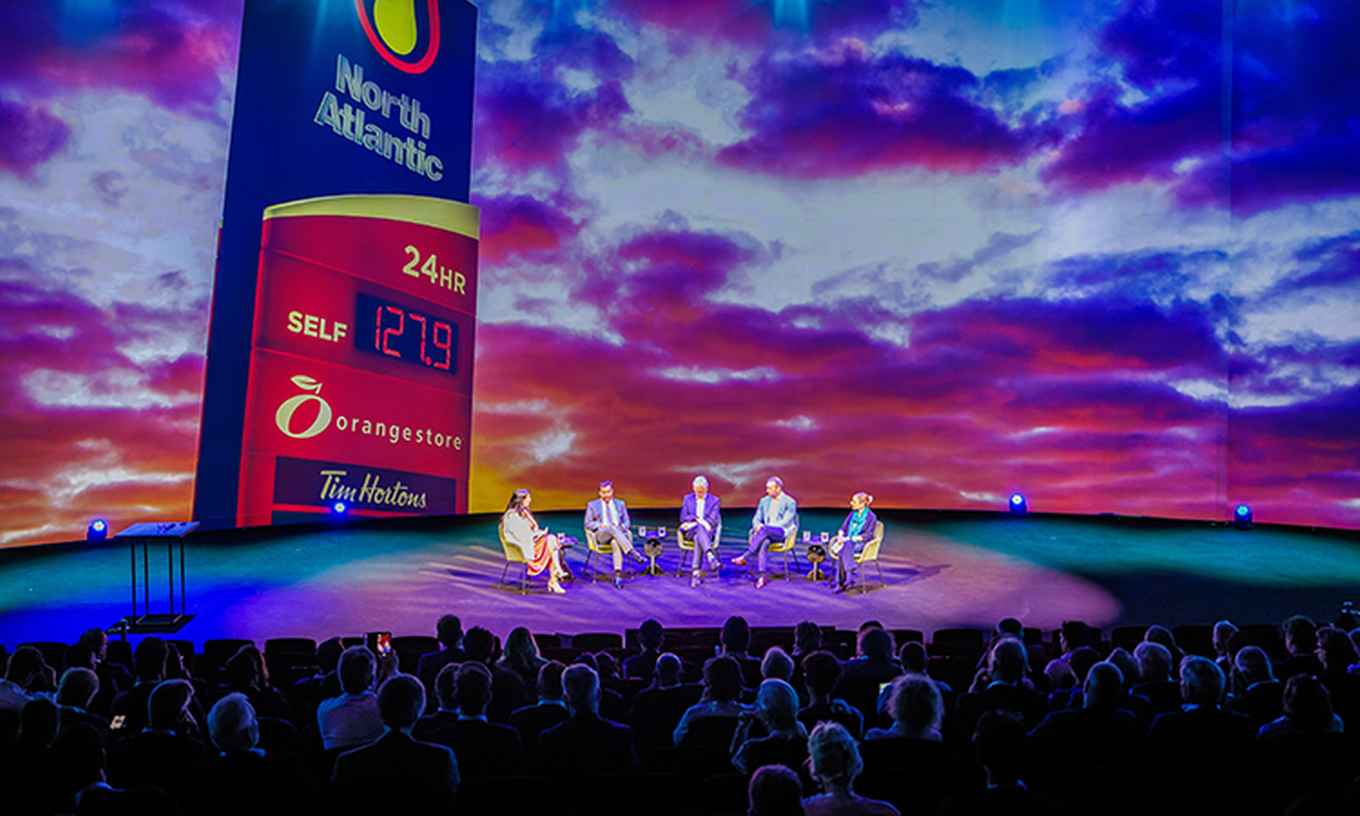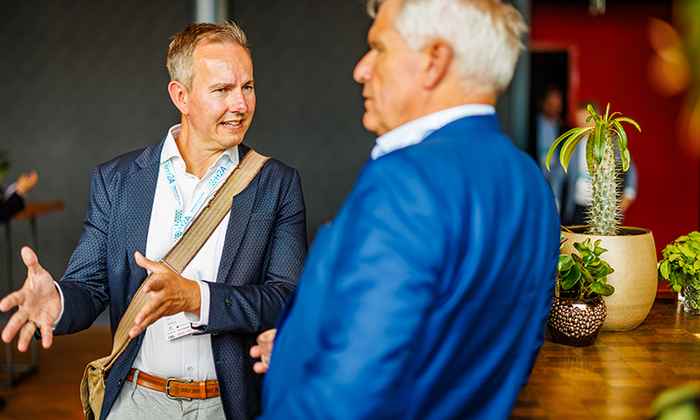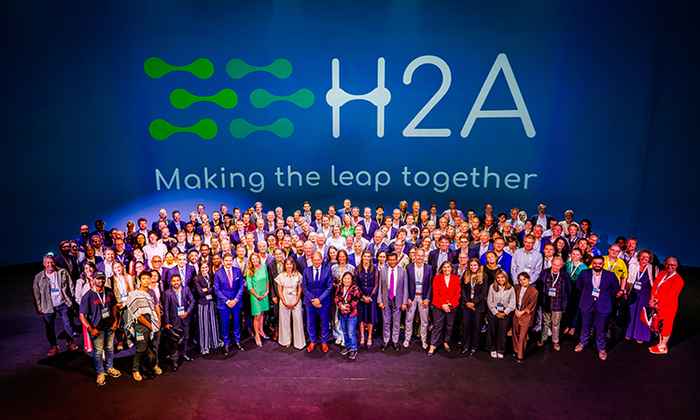Hydrogen infrastructure isn’t just pipes and terminals, it’s also governance, justice, and legacy
UvA experts’ participation in Hydrogen to Amsterdam symposium
25 June 2025

This year’s H2A motto was: ‘Making the Leap, Achieving Breakthroughs in Hydrogen Imports’. In his speech, Chris focused on the near-term pathways for decarbonizing hydrogen, especially since green hydrogen is not yet feasible at scale. Such paths include carbon pricing, as advocated by SEVEN’s Rick van der Ploeg, to drive the competitiveness of clean hydrogen and importing hydrogen from regions with abundant, low-cost renewable electricity, provided that we solve issues such as zero-emission storage and safe and efficient hydrogen transport.
Chris explained that in our current global hydrogen economy, 100 million tonnes of hydrogen are—often locally—produced and used in the chemical industry every year. Almost half of that is fertiliser, which is needed to produce food. Current hydrogen production is, however, not clean and has substantial CO2 emissions.
CO2 capture needs to be added
The first target in becoming competitive and more sustainable, according to him, is to decarbonise the production of H2 by adding CO2 capture to existing production. This can also be done with new technologies like methane pyrolysis that converts natural gas to solid carbon and hydrogen, and also through water electrolysis.

Chris: ‘To produce clean hydrogen at a different location becomes interesting if clean and cheap electricity is abundant, so production – including storage and transport – becomes cost competitive with local clean hydrogen production.
So, to allow large-scale transport and import in the form of liquid hydrogen is one option. For this hydrogen gas can be liquified to increase the energy density and cooled to -253°C. The costs of liquefaction is 25-30% of the energy content.’
The main challenge is the boil-off
Chris pointed out that the main challenge is the boil-off, the gaseous hydrogen that escapes when liquid hydrogen absorbs heat and vaporizes during storage or transportation (up to 1% of hydrogen emissions a day), and since hydrogen is an indirect greenhouse gas, liquid H2 storage has to be zero boil off. New, affordable technologies for zero boil-off are essential for advancing the industry competitiveness, which makes liquefaction of hydrogen interesting to compare with other ways of safe and efficient hydrogen storage, for example in the form of Liquid Organic Hydrogen Carriers.
Last but not least, Chris mentioned the absence of a functional, global CO2 tax as a major factor stopping hydrogen production technologies from becoming more competitive. In short, this is what is needed according to Chris:
- New hydrogen storage technologies to allow large-scale transport;
- Industrial partners to collaborate on this exciting task, which still depends on research and technology development;
- Bright minds in academia keen on real data, e.g. techno-economic analysis to compare local clean hydrogen production versus elsewhere together with import.
In the coming months the second R&D programme of GroenvermogenNL’s programme on storage and transport will be created with a sole focus on import. So companies, ideally with a Dutch R&D site, contact me if you want to participate!Chris Slootweg
A compelling case for the certification of hydrogen
Like any climate or energy scenario, pathways to future use of hydrogen must ensure that principles of fairness and equity are upheld – a foundational theme for SEVEN.
Margaretha Wewerinke-Singh, an Associate Professor of Sustainability Law at the University of Amsterdam and co-founder of SEVEN made a compelling case for the adoption of a single, internationally recognised sustainability certification for hydrogen. Such a standard would translate internationally agreed standards—including climate targets and human rights—into a simple market signal: only hydrogen that is demonstrably green and just can flow across borders and into our economies. Ports like Amsterdam, with their gateway position, can pilot this regime and prove that circular, rights-based infrastructure scales.

Margaretha reminded those present that infrastructure isn’t just pipes and terminals, it’s governance, justice, and legacy. Margaretha: ‘Infrastructure is not value-neutral. The Aarhus Convention establishes that communities have the right to know, to participate and to seek justice in environmental decision-making.
Transparent planning is therefore not a bureaucratic nicety; it is a legal duty and a source of social licence. Likewise, courts worldwide increasingly interpret human rights – such as the rights to life, health and an adequate standard of living – to include protection from climate harm. In practice, that means hydrogen supply chains must be traceable and fair in their entirety.’
She defined three leadership principles for the decade ahead:
- Think of infrastructure as governance. Every valve, sensor and data ledger encodes choices about whose standards prevail and whose voices are heard;
- Always design for fairness and inclusivity. Who is left out; how can we design more inclusively and avoid perpetuating inequalities?;
- Institutionalise transparency. Public access to information, rigorous certification and accountability of public and private actors convert moral ambition into legal certainty.
The name SEVEN is inspired by Indigenous wisdom: the decisions we make today must benefit people seven generations into the future.Margaretha Wewerinke-Singh
Seven generations
While this won’t happen overnight, the lack of clarity for users and consumers, the continued climate harms from non-sustainable hydrogen and the absence of an agreed target to work towards make this vision more urgent than ever. SEVEN is committed to advancing all these fronts: certification, decarbonization, carbon pricing, safe transport, and equitable policy. All pathways to future use of hydrogen require that principles of fairness and equality are upheld – a foundational theme for SEVEN.
